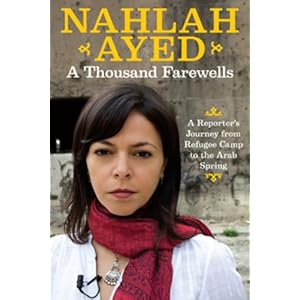One of the great thing about being assigned to read a book for school is that it makes me read books I would normally never know about.
I generally read quite a bit, but normally stick to fiction and the last four books I read were all horror novels by Dean Koontz so reading A Thousand Farewells by Nahlah Ayed was a great departure for me.

The book grabbed me quickly. There was a familiarity to it immediately because Ayed talks about her time in Winnipeg and mentions streets and landmarks that are familiar to any Winnipegger. But just as soon as I thought the story would be all about a childhood in Canada her family moves to a refugee camp in Amman, Jordan. The sections about her time as a child in Amman were very interesting to me because I just couldn't believe any family would chose to return to such a difficult life only to make sure their kids understand their culture, when they had the opportunity to stay in Canada
While reading about this, I actually found myself flipping back to confirm to myself that the family had actually chosen to go back. The whole idea seemed so bizarre to me, considering the conditions their kids had to endure in and that is what made it interesting. I believe Ayed must have been very affected by this period in her life because she remembers and describes it all so vividly.
When I started the book I wondered why this journalist would even focus any time on her childhood, but the move to Amman suddenly made it very obvious that her childhood is such an important part of her story.
The start of the book works well to paint a picture of how Ayed became interested in foreign reporting.
The book also does a great job of describing the time Ayed spent in some of the worlds most volatile regions. It shows some of the nightmare scenarios she dealt with including thinking she would die. The book also gives a great picture to the reader of what life would be like in war torn countries. North American's see clips of what is going on in the Middle East on the news but rarely get such a comprehensive picture painted for them.
I did find the book hard to follow at times and that was one of the drawbacks. On more that a few occasions I had to flip back and re-read long passages because I got confused about where Ayed was or who she was talking about.
As a journalist the book taught me the importance of humanizing stories. The book is powerful because she is able to show how war and tragedy has affected real people and families. When a journalist can tell human stories it often makes their work far more powerful.
The only other non-fiction work I have read in a long time is Journey for Justice by Mike McIntyre. It may seem like a stretch to compare the books but both books worked because of their descriptiveness. Journey for Justice quickly grabbed me by describing the despair the Derksen family endured during the time their daughter was missing and A Thousand Farewells grabbed me by describing the despair Ayed felt in a refugee camp as a child. Both books flowed like novels in the start despite being works of non-fiction.
A Thousand Farewells affected me because I often don't think about how lucky I am to have been born and raised in a country like Canada. Ayed's descriptions of what many people in war-torn countries deal with on a daily basis and what many children deal with and experience gave me a appreciation for the life that we live here in Canada.